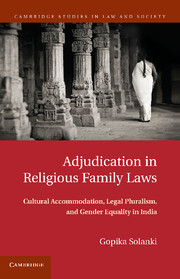 Adjudication in Religious Family Laws
Adjudication in Religious Family Laws Marriage, Divorce, and the Conjugal Family in Hindu and Muslim Personal Laws
Published online by Cambridge University Press: 03 May 2011
Introduction
Whereas many academic discourses and popular debates pitt Hindu and Muslim laws as opposite and dissimilar to one another, this chapter, based on the analyses of trends in matrimonial disputes in Hindu and Muslim personal laws, demonstrates that there are many commonalities between judicial bargaining, interpretation, and treatment of cases filed under distinct provisions of Hindu or Muslim religious laws. Indeed, the Hindu and Muslim conjugal families are formed along similar, though not identical lines. In addition, whereas feminist and legal scholars have long assumed that Muslim Personal Law is detrimental to women's interests in part because of the Shah Bano case and the introduction of the Muslim Women's (Protection of Rights on Divorce) Act 1986, we find here that the data do not demonstrate a wide variation between rights accorded to Hindu and Muslim women; in fact, divorced Muslim women have more rights than divorced Hindu women in some instances.
This chapter examines the adjudication process in Hindu and Muslim personal laws in state law and courts, analyzes the substantive and procedural aspects of matrimonial provisions in Hindu and Muslim personal laws, and gives an overview of the relevant trends in matrimonial disputes. It discusses the function of the Family Court in Mumbai, traces the interaction between state and society within the formal legal system, and assesses its impact on the construction of the conjugal family and gender equality in state law.
To save this book to your Kindle, first ensure [email protected] is added to your Approved Personal Document E-mail List under your Personal Document Settings on the Manage Your Content and Devices page of your Amazon account. Then enter the ‘name’ part of your Kindle email address below. Find out more about saving to your Kindle.
Note you can select to save to either the @free.kindle.com or @kindle.com variations. ‘@free.kindle.com’ emails are free but can only be saved to your device when it is connected to wi-fi. ‘@kindle.com’ emails can be delivered even when you are not connected to wi-fi, but note that service fees apply.
Find out more about the Kindle Personal Document Service.
To save content items to your account, please confirm that you agree to abide by our usage policies. If this is the first time you use this feature, you will be asked to authorise Cambridge Core to connect with your account. Find out more about saving content to Dropbox.
To save content items to your account, please confirm that you agree to abide by our usage policies. If this is the first time you use this feature, you will be asked to authorise Cambridge Core to connect with your account. Find out more about saving content to Google Drive.